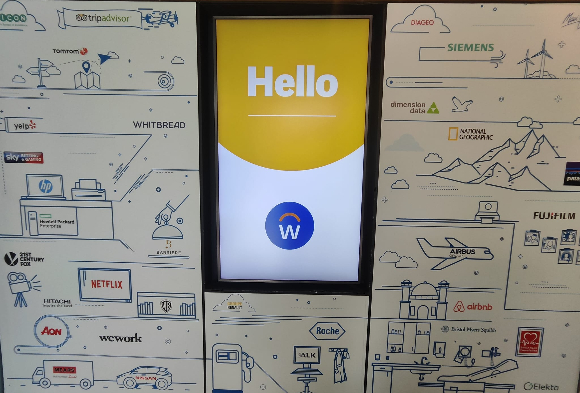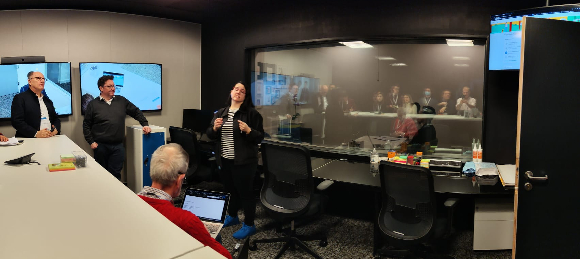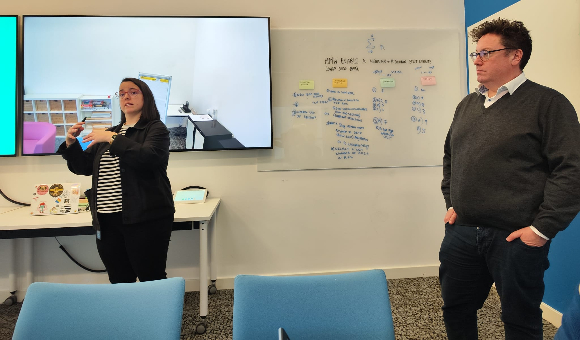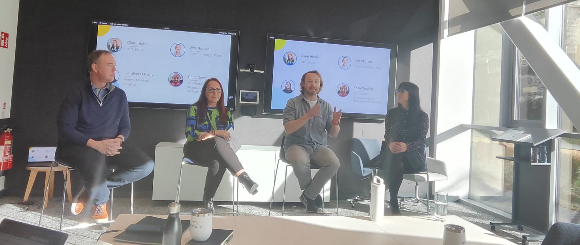Workday Ireland study tour 2024
Workday followed the growing cadre of technology organisations taking the (arguably somewhat progressive) approach to media and analyst relations by hosting a study tour of its Dublin headquarters premises this month. But before we get to the event, let’s recap on recent Workday developments.
As detailed here on Computer Weekly, Workday has a defined focus on AI (predictive, causal and of course generative), which it is applying at multiple tiers and levels of its Human Resources (HR) and finance platform.
With a dedication to only using what it calls its own ‘really good data’, the company has in recent months put more AI in Workday Human Capital Management (HCM) to simplify and lift the workplace management experience by empowering managers with the tools to provide timely insights and recommended actions around things like team time off, important dates, employee skills, sentiment, goals etc.
Workday’s Manager Insights Hub uses AI and ML to bring forward management-level recommendations (such as workplace connections worth making, mentors that should be assigned and gigs i.e. work opportunities) so that teams can identify the opportunities for their employees based on skills and interests.
With these developments in mind and with half a year since the company detailed platform expansions at Workday Rising, the Computer Weekly Developer Network team got ready for some hard-core workplace technology blarney.
#WorkdayInnovation
Staged under the hashtag #WorkdayInnovation, the Workday Europe Innovation trip kicked off with a welcome and look around the company’s Customer Experience Centre hosted by Graham Abell, VP of software engineering & Ireland site lead at Workday and Victoria MacKechnie, director of corporate affairs and operations.
Keen to showcase the work of the company right across EMEA, Abell spoke of the firm’s long term growth plans. With his group’s ‘customer success’ team based in Dublin, he is dedicated to ‘translating the Workday platform’s relevance’ to the local market in Ireland and the wider EMEA region. Now with Workday having been established in Eire for 15 years (initially via a local market acquisition related to a company called Cape Clear) the company now has 4000 employees across Europe, with a datacentre in Dublin and another in Amsterdam.
With 2000 employees in Ireland itself, the company has 70 different nationalities working in the country. With around 80% of the staff in Ireland working in product innovation in the organisation’s Research & Development (R&D) function, the company now has two headquarters locations in the country.
The intersection of people & technology
Mackechnie explained how a new university partnership in Ireland (with Technological University Dublin & Trinity College) is also focused on research, an initiative that she says is focused on the intersection of people and technology.
By 2026 the company wants a significant proportion of its staff base to go through entrepreneurial, machine learning and technology development initiatives in line with its university relationships.
Innovation in EMEA
Into the research lab facility tour and press were given an overview of how Workday approaches usability feature analysis across its platform. By combining professionals focused on qualitative research, quantitative research and the work of data scientists, the company has an emphasis on combining cross-functional teams in wide open room spaces to engage in problem-solving and engage in design sprints.
Now building its own Large Language Models (LLMs) to build its own AI technologies, Workday is using a combination of publicly available data sets with a proportion of its own (non personally sensitive) information in its processes.
With a series of office sets-up – even one including one featuring a soundproof two-way mirror for’active consent’ user observations – a live Workday usability study demo was run to study user reactions inside a Workday application’s menu structure, search bar functions and data navigation options throughout the content presented. Over and above analysing Workday software, the company can also use these scenarios and facility to study usability in third party software so it can work on integration elements where they exist.
Taking attendees forward into the methods and methodologies the company is using to expand and enhance the Workday platform, a session devoted to country-specific innovation in the EMEA region was hosted by California-based company chief technology officer (CTO) Jim Stratton, CTO for EMEA region Clare Hickie, VP of product development Enda Dowling and Workday general manager of analytics Caroline O’Reilly.
A ‘for life’ development commitment
According to Stratton, the company wants customers to be on the Workday platform ‘for life’, so (making that possible) involves and necessitates customers existing very much as partners. This is so that they can help evolve the platform along with the application and data services that it delivers i.e. in a way then, making Workday very much a live-deployment that evolves over time. With thousands of customers attending the Workday Rising conference (in the USA each year and at the EMEA leg of this show), CTO Hickie said that her teams ‘feels the energy’ at these events and uses them to drive its development roadmap.
O’Reilly underlined the fact that the Dublin office is the largest R&D operation outside of the company’s USA presence. With the public cloud architecture and design for EMEA stemming from this facility, there is also customer support functions in Ireland for product performance analysis and testing, which work to deliver a big European chunk of the company’s total R&D effort.
At the risk of not covering AI, Stratton underlined how Workday has been working on AI for around a decade now and have somewhere around 50 use cases in its platform currently that are Machine Leaning (ML) driven.
“People are really starting to get it [the AI proposition now] and businesspeople see that change is coming to the workplace, so we’re driving that with the underlying systems that companies use in the workplace,” said Stratton. “As LLMs come online, we can embed them into the platform as and where needed to be able to take advantage of them and accelerate the application development side of what we do. What we’re looking at now in terms of human-machine innovation is looking at new use case that really change the way we all work and live. We have a bunch of good old fashioned Machine Learning in the platform that has enabled us to leverage and develop many of the new technologies [such as ChatGPT] that have surfaced in the last 15-18 months in particular.”
Because of the nature of the data that Workday holds on companies’ employees is so essentially sensitive (pay, job status, possible redundancies and so on), the company insists that it takes a very hard-core approach to AI safety and work focused on making sure hallucinations do not surface across its platform and applications.
Workday’s Caroline O’Reilly also highlighted the company’s Future Females Tech programme. This is a two-day tech event for female undergraduate students. She explained that the aim is to inspire and help you understand the careers on offer within the technology sector and gain first-hand experience with Workday. Keen to show young female coders and others who aspire to technology-related careers, O’Reilly said that she is always first to explain that IT is not some quiet solitary cubicle-based career and in fact is a place where real people engagement happens (especially at an HR platform company perhaps) everyday.
Sessions also followed dedicated to examining AI ecosystem & trust gap research.
Not all work, work, Workday
Of course, Workday is all about work, human resources (and human capital management) and financials, but the team were keen to show attendees the warmth of Irish hospitality as well. As such, the Workday Eire crew incorporated a private tour of the Jameson Distillery for Thursday evening, following media interviews.
The distillery is a two-minute walk from the Workday office, how convenient, right?











